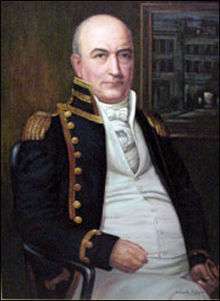Thomas Tingey
| Commodore Thomas Tingey | |
|---|---|
 Commodore Tingey in uniform | |
| Born |
September 11, 1750 London, England |
| Died |
February 23, 1829 (aged 78) Washington, D.C. |
| Resting place | Congressional Cemetery |
| Nationality | American |
Thomas Tingey (11 September 1750 – 23 February 1829) was a Commodore of the United States Navy. Originally serving in the British Navy, Tingey later served in the Continental Navy. Tingey served with distinction during the Quasi-War and would serve as the commandant of the navy yard until his death.
History
Tingey was born in London on 11 September 1750. As a youth, he served in the British Navy commanding a blockhouse at Chateaux Bay on the Labrador coast. He later commanded merchant vessels in the West Indies before coming to the colonies and investing in the East India trade. According to unverified tradition, Tingey served in the Continental Navy during the American War for Independence.
Navy career
In September 1798 Tingey was commissioned a captain in the United States Navy and distinguished himself in the Quasi-War with France, as commander of the man-of-war Ganges. During that time, Tingey commanded a squadron which cruised the waters of the Windward Passage between Hispaniola and Cuba to protect American shipping from French privateers. Tingey commanded Ganges as she took four prizes and is known for his bloodless encounter with the British frigate HMS Surprise.
In January 1800, Tingey was appointed to supervise construction of the new navy yard at Washington, D.C., and became its first commandant on 23 November 1804. In the summer of 1814, as the British advanced on Washington, the Secretary of the Navy ordered Tingey to set fire to the yard. Tingey returned after the withdrawal of the British forces and commanded the yard until his death on 23 February 1829. Commodore Tingey was buried with military honors in what is now known as Congressional Cemetery in Washington, D.C.
Societies
During the 1820s, Tingey was a member of the prestigious society, Columbian Institute for the Promotion of Arts and Sciences, who counted among their members former presidents Andrew Jackson and John Quincy Adams and many prominent men of the day, including well-known representatives of the military, government service, medical and other professions.[1]
Personal life
His daughter Hannah married Tunis Craven,[2] a government clerk and later naval purser. Two of her sons, Tunis and Thomas Tingey rose to prominence in the Union Navy during the Civil War. Another daughter, Margaret, married U.S. Representative Joseph F. Wingate of Maine.
Namesake and honors
Three[3] USS Tingey ships were named for him as well as the Tingey gate of the Washington Navy Yard, Washington, D.C.
References
- ↑ Rathbun, Richard. The Columbian institute for the promotion of arts and sciences: A Washington Society of 1816-1838. Bulletin of the United States National Museum, October 18, 1917. Retrieved 2010-06-20.
- ↑ Tingey, (Commodore) Thomas, 1750-1829., Whittlesey-Whittlesey Genealogy http://www.whittlesey-whittelseygenealogy.com/getperson.php?personID=I3006&tree=JWhittelseyProgeny
- ↑ Wikipedia